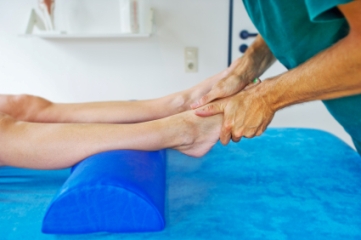A growing body of evidence suggests that psychological factors play an important role in determining whether an athlete makes a successful return to sport following injury.[1]
In my physical therapy practice, one of the first things I assess is the psychological well-being of the injured athlete, ranging from how they respond to questions, eye contact, body posture, and attitude, to whether they fidget with their hands or feet, and how they respond to their parents, who are usually just trying to be helpful.
Particularly with athletes with chronic injuries, I will spend more
time making them believe they have the power to get better than actually
doing the manual techniques, exercises, and modalities that have been
shown to improve healing.

With children it is far more important than just healing a body part, it is supporting a positive attitude. I have had young athletes with lower back pain at just 12 or 13 years old tell me, "I just have a bad back." That is what 80 year war vets say, not children! If this is what they believe, that their back will always hurt, it is far more important to address that concern than just getting them well enough physically to return to sport, because if you don't, you are setting the child up for whole lifetime of pain.
Safety Net, Not Secret Service
To help your injuried athlete be psychologically ready to return to sports, I suggests to parents that they:
- Treat them like an adult: Do not coddle or baby them. This usually only reinforces what they perceive as positive attention for having pain or problems. Be supportive, but don't treat them like they should be covered in bubble wrap
- Let the professionals take the blame: Doctors, physical therapists, athletic trainers, and other health care professionals deal with your hurt child all the time, of course, but usually for a short period of time. We have a huge advantage; you take them home! Let the rehab team be the bad guys. Don't try to step in and be a therapist. If your child complains, just say, "Your heard what the physical therapist said."
- Be a safety net, not the Secret Service: With any injury, there is going to be pain, setbacks, disappointment, and maybe even a few tears during the rehabilitation process. As a parent, be there to support your child, catching them when they seem to be spiraling down into the dumps. But with injuries, as with sports, and in life, kids have to learn to pick themselves up when they fall down. If your child is on crutches, for instance, let them figure out, if they are physically able, how to open the door, pull out the chair, or get in and out of the shower (if they can do so safely). Sometimes a parent has to resist their natural urge to comfort their injured child, because it can sometimes prevent them from achieving their own mini-milestones. These small accomplishments create a positive outlook that will only increase the chances of, and speed at which, they return to the sport they love.
1. Ardern CL, Taylor NF, Feller JA, Webster KE. A systematic review of the psychological factors associated with returning to sport following injury. Br J Sports Med. 2013;47:1120-1126.
Posted October 30, 2013 Updated April 6, 2015








